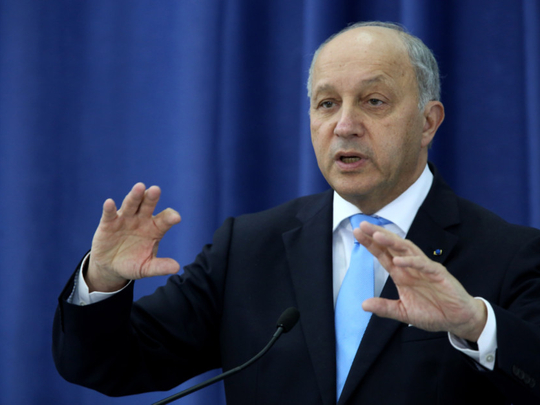
Commenting on French Foreign Minister Laurent Fabius’s trip to the Middle East, the UAE’s Al Bayan said that the visit aims to promote the peace plan prepared by Paris. “The Arabs and people concerned with this conflict, however, have already tried and tested many plans and conferences that did not contribute anything towards resolving this fundamental issue in the Middle East.
“However, the successive Israeli governments since the Madrid Peace Conference in 1991 took advantage of these plans, meetings and initiatives to procrastinate and delay resolving the issue. Arab and international requirements for peace were only met with rejection as Israel exploited its traditional relations with Washington, which turns a blind eye to the reckless actions of Tel Aviv. Any sound plan that aims to be successful must be based on clear points: Setting up a Palestinian state within the 1967 borders with East Jerusalem as its capital. The plan also requires a timetable for its implementation and a mechanism for step-by-step follow-up efforts by Palestinians and Israelis for implementing the plan.”
France’s attempt to revive the Middle East peace process through Fabius seem to be dead on arrival, Oman’s Al Watan noted. “If the US was unable to achieve any progress on this issue, then it is up to Paris to repeat the process and to drown in a sea of Israeli stances that will nullify France’s manoeuvres. Israeli Prime Minister Benjamin Netanyahu has already ignited the crisis with Washington in order to renounce or evade any pressure that might be exerted on him by the US in the future. Netanyahu is only concerned with the expansion of colonies, which remain the most risky component of the ground reality in Palestine. We would like to believe in Paris’s good intention. However Fabius’s political views ascertain that this is nothing more than a media-marketing move, because he is like an Israeli minister in the French government due to the warm relations he has with Israel, and its leadership and [foreign policymakers].”
Commenting on Saudi-Russian relations, Lebanon’s Daily Star said that Saudi Arabia has for years tended to keep a low profile, but the signing of six strategic agreements with Russia signals that this period may be over. “These new agreements signed last Thursday — ranging from nuclear energy to military and the economy — show that Saudi Arabia is growing tired with the Obama administration, and its divergence with its own policies on the Iranian nuclear issue, Syria, Israel and other topics. This might even pave the way for a new era in the Middle East, and restore some kind of equilibrium, not a system in which the US is making all the decisions,” the paper said.
The pan-Arab newspaper Asharq Al Awsat said that the Saudi-Russian rapprochement should not be viewed as a message to Washington or a reaction to its regional policy. “The historic and strategic alliance between Saudi Arabia and US will remain steadfast and of extreme significance to Riyadh ... Washington itself realises that expanding economic and political relations of its allies is a key factor in maintaining security and stability in the region and the world.





_resources1_16a31069e4e_small.jpg)




